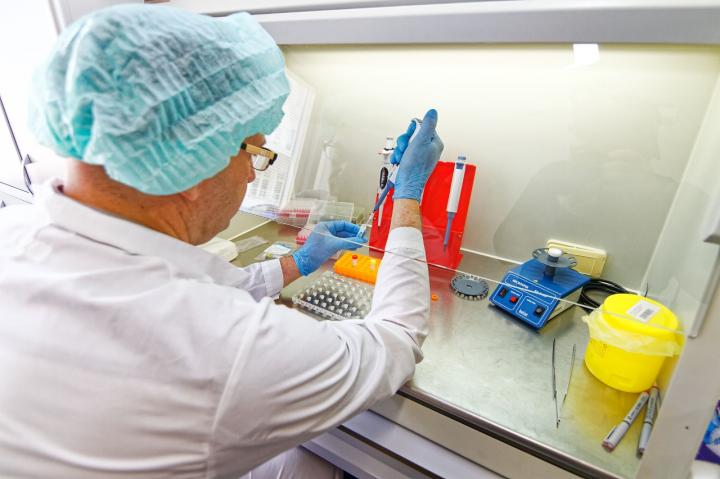Ointments will help patients to get free of some aesthetic defects that inevitably follow the surgery

Credit: FEFU press office
Scientists from Far Eastern Federal University (FEFU), V.I. Vernadsky Crimean Federal University, Dmitry Mendeleev University of Chemical Technology, and Far Eastern Branch of the Russian Academy of Sciences (FEB RAS), assumed the risks of primary skin cancer and its recurrences can be significantly reduced by applying the ointment with antisense oligonucleotides which are short DNA, RNA fragments used in oncology to suppress the synthesis of tumor proteins. A related review was published in Molecules.
The role of antisense oligonucleotides is to support the functions of proteins responsible for apoptosis in the human body. This natural mechanism allows cells to carry out programmed death. As a result of skin exposure to primary damaging factors, such as ultraviolet (natural sunlight, tanning machines UV), these proteins may be restrained to function in the transformed cells, thus the regulation of apoptosis is violating, in some cases it becomes impossible. Due to this, the cells begin to divide uncontrollably and mutate resulting in the tumor occurrence.
The most reliable way to get rid of skin cancer is to cut it out surgically. However, at different stages of tumor progression, especially concerning the most aggressive and lethal types of skin cancer – melanoma and Merkel carcinoma – it’s difficult to recognize the tumor boundaries and depth. Thus, for a surgeon, it’s not clear how much tissues around a tumor area should be removed. The fact is that these tissues may hide isolated tumor cells, which may provoke the relapse of cancer in the future. To cope with that, we consider special ointments as promising treatment, which we suggest as an additional measure to surgical excision. Ointments will help patients to get free of some aesthetic defects that inevitably follow the surgery. In some cases, at the initial stages of the malignancy, ointment-based treatment, perhaps, will allow one to completely avoid the operation.’ Vadim Kumeiko said, Deputy Director for Development, Head of Laboratory of Biomedical Cell Technologies, FEFU School of Biomedicine.
The researchers are focused on the development of an ointment containing antisense oligonucleotides for BCL-2 and survivin proteins. It will be designed to fight over melanoma, the most deadly type of skin cancer. The components of the ointment will penetrate the stratum corneum, and reach the melanocytes and progenitor cells, the mutation of which can lead to the development of a deadly tumor.
One of the main challenges in the development of such an ointment remains the speed of delivery of antisense oligonucleotides into cancerous tissues. These compounds are unstable and can lose their effectiveness even before they reach damaged skin cells. For the same reason, the strategy of direct topical application of the ointment at the area of the damaged cells seems to be more effective comparing to other delivering routes, for example, intravenous.
Skin cancer remains the most common type of malignancy. It accounts for one of the three cases of cancer diagnosed. Ultraviolet radiation of natural and artificial origin is one of the main factors affecting the mutation of human skin cells into tumor cells. As a rule, cancer occurs on the skin areas which are most often exposed to the natural sunlight or tanning machines UV. Men and women of different ages and skin color are vulnerable to skin cancer. In the high-risk group are the elderly, people with white or light-colored skin, with blue eyes, as well as redheads.
###
The work was supported by funding under the Development Program of V.I. Vernadsky Crimean Federal University for 2015-2024.
Media Contact
Alexander Zverev
[email protected]
Related Journal Article
http://dx.




